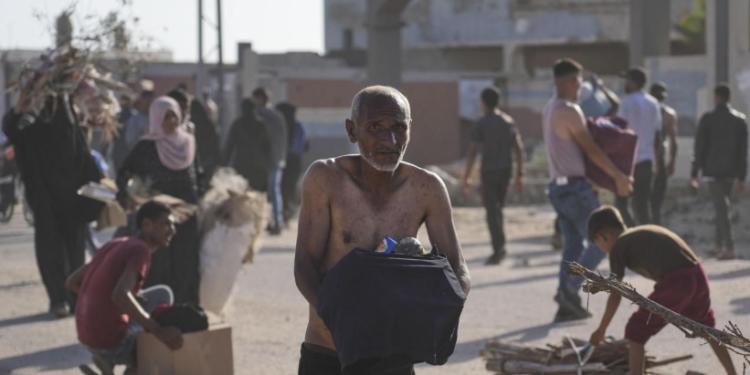At least one Palestinian died and 48 others were injured when forces opened fire on a crowd overrunning a new aid distribution site in Gaza set up by an Israeli and U.S.-backed foundation, Gaza’s Health Ministry reported Wednesday.
Palestinians carried boxes with food and humanitarian aid packages delivered by the Gaza Humanitarian Foundation, a U.S.-backed group approved by Israel, in Rafah, southern Gaza Strip, on Tuesday, May 27, 2025. (AP Photo/Abdel Kareem Hana)
By WAFAA SHURAFA, SAMY MAGDY, and MELANIE LIDMAN, Associated Press
Crowds broke through fences around the distribution site Tuesday, and an AP journalist heard Israeli tank and gunfire and saw a military helicopter firing flares.
It remains unclear whether Israeli forces, private contractors, or others caused the death and injuries. The foundation said its military contractors did not fire on the crowd but “fell back” before resuming aid operations. Israel said its troops nearby fired warning shots.
Ajith Sunghay, head of the U.N. Human Rights Office for the Palestinian territories, told reporters in Geneva earlier that 47 people were wounded, mostly by gunfire.
In a related event, Israel conducted airstrikes Wednesday on the international airport in Yemen’s capital, Sanaa, destroying the last plane of the country’s flagship carrier. The strikes followed missile launches by Iran-backed Houthi rebels targeting Israel in recent days, which caused no casualties.
The Israeli military said it destroyed aircraft used by the rebels. It’s not yet clear if anyone was killed or wounded in the strikes.
The distribution hub outside Rafah, Gaza’s southernmost city, opened the day before by the Gaza Humanitarian Foundation, which Israel has designated to manage aid operations.
The U.N. and other humanitarian groups have rejected the new system, arguing it cannot meet the needs of Gaza’s 2.3 million residents and allows Israel to use food as leverage to control the population. They have also warned of potential clashes between Israeli troops and those seeking supplies.
Palestinians have grown desperate for food after nearly three months of Israeli border closures pushed Gaza toward famine.
Israel says it helped create the new aid system to prevent Hamas from diverting supplies but has not provided proof of systematic theft. U.N. agencies say they already have mechanisms to prevent diversion.
GHF reports it has set up four hubs, two already operating. These are guarded by private security contractors and enclosed by chain-link fences, resembling military bases surrounded by large sand berms.
Israeli forces remain stationed nearby in what Israel calls the Morag corridor, a military zone separating the mostly abandoned city of Rafah from the rest of Gaza.
The U.N. and other aid groups refuse to take part in GHF’s system, saying it breaches humanitarian principles. They argue it could enable Israel to forcibly displace residents by requiring them to relocate near a few distribution hubs or face starvation, which violates international law.
Israeli Prime Minister Benjamin Netanyahu said Tuesday there was “some loss of control momentarily” at the distribution site but added, “happily, we brought it under control.”
He reiterated Israel’s plan to move Gaza’s entire population to a “sterile zone” in the south while troops fight Hamas elsewhere.
Throughout the conflict, the U.N. and aid groups have run large-scale operations distributing food, medicine, and supplies wherever Palestinians live. Israel says GHF will replace that network, but only a small amount of aid has entered Gaza for U.N. distribution in the past week.
The Israeli strikes on Yemen’s main airport destroyed the last plane of Yemenia, the country’s flagship carrier, according to the airport.
Yemenia had four registered aircraft, per plane tracking website FlightRadar24. Israel destroyed three planes in a May 6 airstrike on the airport that also heavily damaged the runway.
Footage released Wednesday showed a smoking Yemenia plane cut in half amid debris on the runway.
Israeli Defense Minister Israel Katz said Wednesday’s strikes destroyed the last plane used by the Houthis.
The Houthis have targeted Israel during the Gaza war in solidarity with Palestinians, raising their profile as the only member of Iran’s “Axis of Resistance” capable of launching regular attacks on Israel.
Most Houthi missiles have been intercepted, though some breached Israel’s missile defenses, causing casualties and damage. Israel frequently strikes the rebels in Yemen, especially near the vital port of Hodeida.
Netanyahu said Israel will continue striking as long as the Houthis launch missiles. “Whoever doesn’t understand it by force — will understand it by more force,” he stated.
The Gaza war began when Hamas militants attacked southern Israel on October 7, 2023, killing around 1,200 people, mostly civilians, and abducting 251. Hamas still holds 58 hostages, about a third believed alive. Others were released in ceasefires or agreements. Israeli forces have rescued eight and recovered dozens of bodies.
Israel’s retaliation has killed over 54,000 Palestinians, according to Gaza’s Health Ministry, which says most of the dead are women and children but does not separate civilians from combatants.








